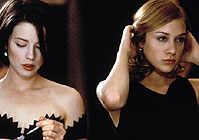|
|
|
|
The
Last Days of Disco
|
 |
|
The Last Days of Disco is a sore disappointment on so many levels. It shows writer-director Whit Stillman (Metropolitan, 1990, Barcelona, 1994) stepping well beyond the limit of his evident capabilities. And, as a fitting encapsulation of a fascinating era in pop culture, it is a non-starter. Stillman writes far better than he directs. An American counterpart to Éric Rohmer, his gift is in capturing the specific, brittle repartee of the yuppie set as its members unwittingly reveal their murky complexes, immature desires and naked ambitions. Stillman's preferred genre is the comedy of manners – with special emphasis on modern, Jane Austen-style rituals of social interaction and courtship. As in Barcelona (his best film to date), Stillman stages a complex narrative on two levels – the personal and the social. As individuals, Alice (Chloë Sevigny) and Charlotte (Kate Beckinsale) could be representative young professionals from any recent decade. Like the cohabitating heroines of The Best of Everything (1959), they negotiate the traps of both the publishing industry and the dating game. Stillman, however, has a grander ambition – to employ the disco scene of the early '80s as a microcosm of broader social trends. So, woven into the personal tale is a shadowy sub-plot involving crime and corruption, money and business fortunes. The apocalyptic last days of the title conjure the passing of not only a taste in popular music and a hedonistic, pre-AIDS lifestyle, but also a phase of small-scale, entrepreneurial capitalism. As that description might suggest, The Last Days of Disco is about too many things. Stillman is too busy multiplying his characters, plot threads and socio-political intrigues to maintain any consistent focus or create a satisfying, coherent mood. There are some fine lines of dialogue, situations and performances, but none of the characters really draw us into the fragility and poignancy of their historical moment. Like too many American directors who have arisen from the independent sphere – such as Kevin Smith, Hal Hartley and Quentin Tarantino – Stillman is overly fond of his own beautifully crafted dialogue. His staging and cutting are invariably elemental – as if to forever keep down the costs and highlight the spoken word. This no-frills style fails him here. Few films have given so little sense of what nightlife is actually like. Stillman shoots all his club scenes (and there are many) in exactly the same way. First, he gives us a panoramic shot of listlessly dancing bodies – usually with some weirdo or fancy-dress nerd wandering into the frame for comic effect. And then he cuts to a convenient corner where his characters can carry out their urbane banter seemingly far removed from the rhythm and sweat of the dance floor. Stillman's static, wordy, relentlessly unphysical manner as a director suggests that he may not have been the ideal person to fashion a tribute (however ironic) to the disco era. Although there is much idle speculation among these vacuous characters about the deeper meaning of this social scene, a little archival footage of the "death to disco" movement and a rather lame attempt to glitz proceedings up in the final seconds, Stillman's film remains hopelessly disconnected from the spirit of its subject. Disco needs a Warhol, an Almodóvar, a Moroder – artists who can appreciate and revel in high-key, trashy glamour – to bear it worthy witness, not an ersatz Woody Allen. © Adrian Martin September 1998 |
![]()